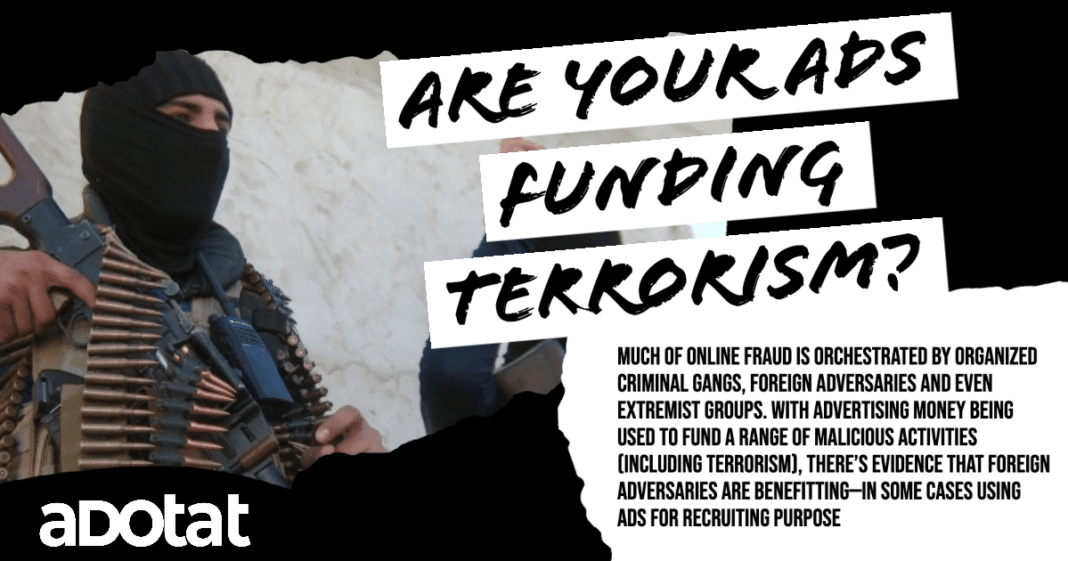While brands are rightly concerned about their advertising showing on sites that promote white supremacy and terrorism, they may be surprised to learn that many fraudulent ad activities go toward funding such causes.
Across the pond in Great Britain, The UK Stop Ad Fraud Coalition (UKSAFC) has been set up by a group of advertising professionals, policymakers, technology providers, and agencies to tackle the problem of ad-funded crime in the United Kingdom.
The ad industry is plagued by fraud. Fraudsters use automated systems to generate fake views and clicks from sophisticated bot networks, which eat into advertisers’ revenue while misplaced ads, revenue fraud, and malvertising thrive online.
Much of this fraud is orchestrated by organized criminal gangs, foreign adversaries, and even extremist groups. With advertising money being used to fund a range of malicious activities (including terrorism), there’s evidence that foreign adversaries are benefitting—in some cases using ads for recruiting purposes.
Drug cartels in Mexico are increasingly turning to the internet and bitcoin as a way of laundering money and selling drugs, according to the United Nations Office on Drugs and Crime. The report said Mexican cartels are believed to launder about $25 billion a year in Mexico through various methods, including laundering through “advertising companies” and bitcoin-based money laundering.
The report said that “the internet has become a key tool in the hands of drug traffickers and other organized crime groups, who use it to facilitate their activities and expand their reach.”
The report added that Mexican cartels are also using social media advertising to sell drugs and recruit new members, as well as spread disinformation about law enforcement operations.
My friend and fraud expert Dr. Augustine Fou calls it the “Laundromat of Digital Advertising and he often observed that “digital advertising is the most scalable, versatile, cost-efficient, and safe washing of funds you can find anywhere at any time. But that’s only the tip of the iceberg — now add in international tax evasion, organized crime, funding of terrorists and hate groups—and you begin to glimpse a world where digital advertising is concerned.”
After splitting drug proceeds into small payments to avoid controls, the cartels “then use those accounts to buy a series of small amounts of bitcoin online, obscuring the origin of the money and allowing them to pay associates elsewhere in the world.”
According to a friend at the US Department of Justice who wasn’t authorized to speak to the press, ” There are more than a few terror finance campaigns that relied on the use of low-tech tools, such as cash and courier services, in addition to high-tech ones like digital currency donations from around the world. This is a growing issue and while the US is at the forefront of fighting this, often criminals are way ahead of the curve.”
Why is it so scalable? Since everything happens online, it’s easy for big numbers to be manipulated and reported—there are no physical products or activities (like smuggling) where the value could easily be verified. “Because of its scalability and the fact that it is often invisible to consumers, digital advertising offers a low-cost laundry for those wishing to conduct illegal activities,” says Fou.
Chris Morgan, Founder of MAP comments:‘It’s already a huge leap forwards that clients and agencies alike have got on board with the coalition; sharing their expertise and showing a willingness to take action. By talking to government and enforcement agencies, building up research, and sharing expertise and knowledge, we will deliver a world-leading initiative that drives action.”
The UKSAFC will serve as a forum for sharing information on the problem and coordinating efforts to address it.
The goal is to create a template that other countries can use as they tackle the problem of advertising fraud. Once the UK identifies and publicizes its scale, it will show others what’s at stake so people know how big this issue really is. That should help coordinate efforts by multiple stakeholders towards solving it
On the advisory team is policy, regulation and Government Affairs specialist – former CEO of Radiocentre and Senior Civil Servant – Ian Moss. He explains: “As an industry, we still haven’t managed to crack this issue. Yet there is a huge appetite out there and so we are seeking to get the whole value chain together. We are also ruthlessly following the money – looking at who is committing the fraud.
This is a serious step in the right direction of treating advertising fraud like a major crime, not just a “problem” that the industry can’t deal with.










